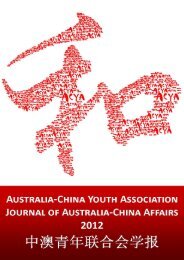a-chinese-stretch-of-the-imagination
a-chinese-stretch-of-the-imagination
a-chinese-stretch-of-the-imagination
Create successful ePaper yourself
Turn your PDF publications into a flip-book with our unique Google optimized e-Paper software.
I have some sympathy for <strong>the</strong> academics, because <strong>of</strong> <strong>the</strong> way public<br />
discussion is <strong>of</strong>ten reduced to caricature by <strong>the</strong> media, <strong>the</strong> dismissive<br />
spin with which government responds to intellectual debate, and<br />
<strong>the</strong> personal denigration that too <strong>of</strong>ten greets different views. Not to<br />
mention <strong>the</strong> distraction <strong>of</strong> <strong>the</strong> contemporary Australian university<br />
environment, with its tyranny <strong>of</strong> KPIs, performance reviews, survey<br />
and information demands from government, competition for funds,<br />
and academic contribution measured in work points. A group <strong>of</strong> Sinologists<br />
told me recently <strong>the</strong>y couldn’t do public policy because it<br />
didn’t give <strong>the</strong>m work points. Work points! In China <strong>the</strong>y went out<br />
with Chairman Mao. But Henry’s observation is true <strong>of</strong> many China<br />
academics, a problem Pr<strong>of</strong>essor Barmé has underlined heavily in <strong>the</strong><br />
excellent 2012 China Story Yearbook. 8<br />
And it’s true also <strong>of</strong> <strong>the</strong> White Paper process. As some have pointed<br />
out, in <strong>the</strong> past <strong>the</strong>re was a practice <strong>of</strong> first putting out a Green Paper<br />
canvassing <strong>the</strong> big ideas and encouraging public debate around those<br />
ideas before getting to a more policy-definitive White Paper. But in<br />
launching <strong>the</strong> Asian Century White Paper, <strong>the</strong> Prime Minister simply<br />
told us it is ‘<strong>the</strong> plan which answers <strong>the</strong> question’. 9<br />
We have to thank Hugh<br />
White for stirring into<br />
wakefulness <strong>the</strong> debate<br />
about our future with<br />
China. But here again, beyond<br />
bits <strong>of</strong> riposte and<br />
tit-for-tat and self-awarded<br />
ticks, <strong>the</strong> government<br />
itself has not really engaged<br />
in that debate with<br />
a coherent narrative <strong>of</strong> its<br />
own.<br />
Stephen FitzGerald and a representative <strong>of</strong> <strong>the</strong> Chinese<br />
Ministry <strong>of</strong> Agriculture who is taking delivery <strong>of</strong> Prime<br />
Minister Whitlam’s gift to mark his autumn 1973 visit:<br />
a Murray Gray Bull, ‘Saber Bogong’.<br />
Courtesy <strong>of</strong> Stephen FitzGerald<br />
我对于学术界的境遇怀有几分同情。公众辩论往往被媒体进行漫画式<br />
的简单化,知识界的辩论往往被政府冷嘲热讽,持不同意见者们也往<br />
往互相攻讦,欲置对方于死地而后快,更不必说当今的澳大利亚大学<br />
环境了:绩效考核、表现评价、来自政府的各式各样的信息调查、为<br />
获得经费而进行的竞争,尤其是以分值形式计算的论文发表数量与采<br />
用刊物等第。连中国的人民公社的工分都已经和毛主席一道归西的当<br />
今,我们的教授们却在为工分而苦恼!我当然不是说中国的学术界没<br />
有面对相似问题,关于此事,在白杰明教授所编的那本精彩的《2012<br />
年中国的故事年鉴》一书中亦有论及 8。<br />
白皮书的出台与上述情形类似的本末倒置。现已有人提出,此前的通<br />
例是先发放一本将基本观点勾勒出来的绿皮书,然后对这些观点进行<br />
公众辩论,进而得到在政策层面十分具体的白皮书,而在这次发布亚<br />
16 17<br />
洲世纪白皮书的时候,<br />
总理仅仅是简单地告诉<br />
我们说这东西‘有问必<br />
答’ 9。<br />
我们必须感谢修·怀<br />
特,是他引发了有关我<br />
们与中国的共同未来的<br />
辩论。令人遗憾的是,<br />
除了巧言善辩之辞,政<br />
府并没有提出过完整自<br />
洽的叙事,也没有真切<br />
地参与到辩论之中。



